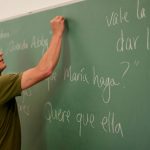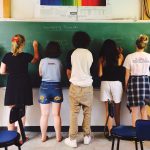History and Social Sciences
istory and social science courses at Buxton aim to fulfill several interconnected goals: to ensure that students acquire a solid working knowledge of political, social and cultural history; to train students in the skills of critical reading and analysis; to educate students to understand and evaluate competing arguments and to present their opinions in a clear and reasoned way, and to create engaged, informed citizens.
Students acquire a critical understanding of the society around them, learn to appreciate its complexity, grasp the ethical stakes involved in its design, and comprehend that design as historically constructed. With that understanding, they can begin to see themselves as historical actors and agents. The annual All-School Trip, in which the entire faculty and student body travel together to a North American city to study that city intensively for a week, is one of the most pivotal components of a Buxton student’s historical education.
Psychology of Development is a course designed to give an overview examining the progressions of growth from womb to tomb. We will be looking into fundamental theories, social-emotional development, and the interaction of biological, psychological, and social aspects of human development (nature v. nurture). In this course we will focus most on early childhood, into adolescence and young adulthood.
This class will balance hands-on and theoretical approaches to reimagining and reinventing community spaces. We will study the history of utopian architecture, looking at intentional communities, cults, communes, and other projects, both good and bad, that aimed to create new structures of community. We will study artists who practice relational aesthetics and seek to create new imaginaries for how we might relate to each other. We will apply what we learn to our own community, taking on collaborative projects to redesign community spaces at Buxton and strengthen connections between us and the school where we all live and study.
Storytelling is one of the cornerstones of both Myth and Religion. Through telling stories, a people begins to foster the overarching ideology of their culture and clan. In this class students will explore myths and spiritual beliefs from Asia, Australia, and the Pacific Islands. The class will first focus on myths and stories of the indigenous people of Australia and Pacific Islands. As the term progresses students will explore the stories and belief structures of Hinduism, Taoism, and Buddhism.
In this course, we will examine queer history across different civilizations and time periods, including Ancient Greece, the Renaissance, and the mid-20th century United States. Students will analyze the ways in which queer individuals have challenged societal norms and contributed to cultural, artistic, and intellectual advancements. We will study key moments in LGBTQ+ activism, including the Stonewall Riots, the fight for marriage equality, and the current struggles for transgender rights. Through engaging discussions, readings, and research projects, students will develop a nuanced perspective on queer history and its relevance to our world today.
A United States History Course is required of all Juniors who have not yet completed a US History course.
How did the United States end up like this? That is the basic question of this course. But also: how do we know what has happened in the past, in this place? And: did it have to happen that way? And finally: why does it matter? Historians Lisa McGirr and Eric Foner have called U.S. history an act of “collective self-discovery,” and that will be our mission. To work together to understand the place where—for better and for worse—we all currently live. Our studies will take us from the first peopling of the land over 10,000 years ago to the current day, with a focus on the United States since its founding in the 18th century. We will also regularly interrupt our chronology to study civic and political institutions in this country today, as well as the role of the historian in recording, studying, shaping, manipulating, publicizing, remembering, memorializing, celebrating, lamenting, telling, and retelling America’s past for America’s present.
This semester, we will explore the question “What political power in the United States?”. This course
will place an emphasis on political participation, both as an individual and as organizations. We will
look at examples from the recent past, to determine what makes one successful in politics, and what
does not. This course will not focus solely on Political Parties, but will also touch on
youth movements, labor unions, grassroots advocacy groups, and more.
An important part of each student’s junior year is the Junior Thesis and Project. The thesis is an opportunity for independent research, creative expression, and learning how to plan and execute a long-term project. Students pick a topic that interests them and spend much of the year researching and writing an ambitious paper about it. Additionally, students are asked to produce a creative piece to complement their academic work. Thesis topics have included the history and practice of ballet, the work of the controversial director Elia Kazan, the tradition and significance of Japanese tea ceremonies, and the history of the Middle East. Creative projects have ranged from staging original one-act plays to doing dance demonstrations to preparing a special meal for the entire school.






















